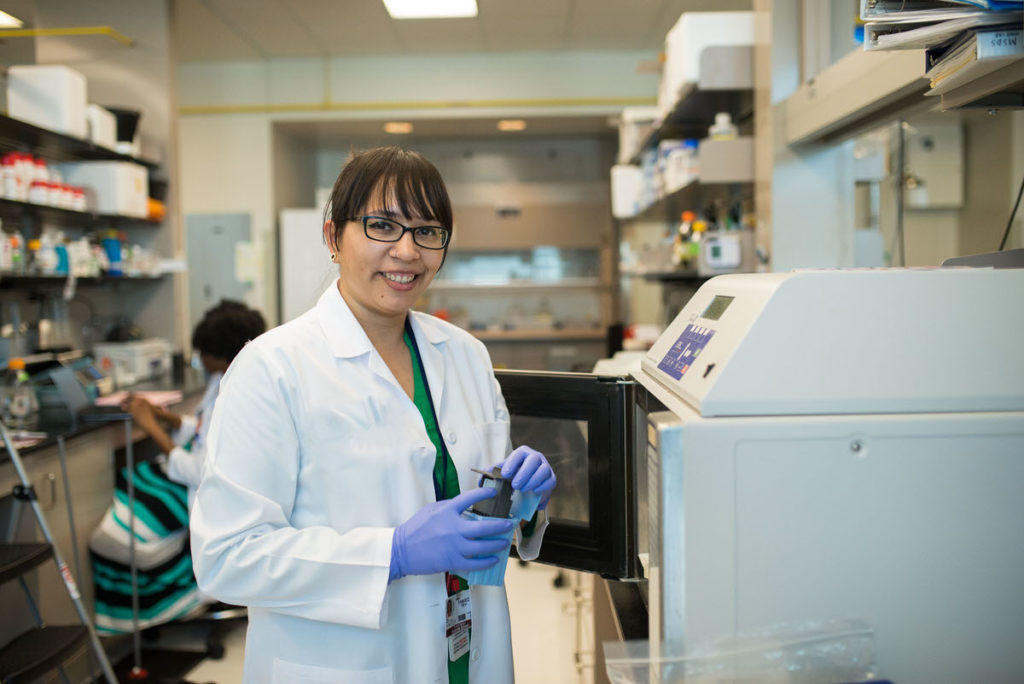In Press: Trevi Mancilla First Author Publication in PLOS One About The Significance Of Non-Cardiomyocyte Cells

 Trevi Mancilla, a student in the South Texas Medical Scientist Training Program, has published a first-author publication in PLOS ONE. The title is “Doxorubicin-induced p53 interferes with mitophagy in cardiac fibroblasts.” Her mentor is Dr. Greg Aune. We interviewed Trevi about her recent achievement.
Trevi Mancilla, a student in the South Texas Medical Scientist Training Program, has published a first-author publication in PLOS ONE. The title is “Doxorubicin-induced p53 interferes with mitophagy in cardiac fibroblasts.” Her mentor is Dr. Greg Aune. We interviewed Trevi about her recent achievement.
1) Tell me about your paper.
The goal of my research was to demonstrate the significance of non-cardiomyocyte cells, such as the cardiac fibroblast, in the pathophysiology of doxorubicin-induced cardiac dysfunction. Childhood cancer patients treated with doxorubicin can develop cardiac dysfunction that progresses to heart failure over the course of decades. The work in this paper investigated two doxorubicin-induced stress responses; one seen in the cardiomyocyte and one seen in tumor cells. The cardiac fibroblast has some similarities with cardiomyocytes and other similarities with tumor cells. I proposed that both stress responses would be activated in the doxorubicin-exposed cardiac fibroblast. Furthermore, these stress responses would interact with each other in a deleterious manner leading to fibroblast dysfunction. Due to the role of the fibroblast in injury response and cardiac maturation, fibroblast dysfunction could initiate the chronic process that leads to heart failure. Upon completion of this work, I found p53 to be the deleterious link between to the two stress responses. Cardiac fibroblasts isolated from mice without p53 had significantly attenuated cellular and mitochondrial dysfunction after exposure to doxorubicin. P53, upregulated from DNA damage and cellular stress, inhibited the cell’s ability to respond to mitochondrial stress through a process called mitophagy.
2) Why is your research important?
My research is important because over half of all children diagnosed with cancer will be exposed to doxorubicin at some point during their treatment. The greatest causes of mortality from late complications of childhood cancer are cardiac disease and secondary cancers. The five-year survival rate of childhood cancer patients is currently over 80 percent. These children are now surviving much longer than that, into their 50s. As more childhood survivors will be facing these complications, it is imperative that we develop ways to protect the heart during and after treatment.
3) What would you like the public to know about your research?
The story of childhood cancer does not end with successful treatment. In addition to heart disease, these survivors face a multitude of health complications as they grow up. These include the aforementioned secondary cancers and cardiac disease, but also liver damage, kidney failure, cognitive dysfunction, infertility, and more. Until we can develop cancer agents that can perfectly target the cancer, childhood cancer survivors will continue to live with the repercussions of their treatments for their entire lives. Learning how to protect the heart while exposed to doxorubicin is only the beginning.
4) What is the next step in your project?
We have bred conditional fibroblast-specific p53 knock out mice. With these mice we can knock-down the p53 gene in fibroblasts only around 2-3 weeks of age. We can then test our hypothesis that the deletion of p53 in fibroblasts is protective in the setting doxorubicin exposure. Further bench research would include determining the effects of p53 deletion on other organelles in the cardiac fibroblast and non-mitochondrial mechanisms by which doxorubicin effects cardiac fibroblasts.
5) What are your next steps in your career?
I am in the last year of my combined M.D./Ph.D. program and will be applying to emergency medicine. I would like to complete a fellowship in surgical critical care following completion of my residency. My desire is to remain involved in research, preferably at the basic science level. This will likely be in the form of improving the acute care of critically sick patients and trauma patients.
6) Anything else you’d like to add.
I would like to thank my mentor, Dr. Greg Aune. As his first graduate student, I did not make things easy for him. However, he was nothing but supportive throughout my training.
In Press is a section in The Pipette Gazette that highlights publications by students. To read more In Press articles, click here.
